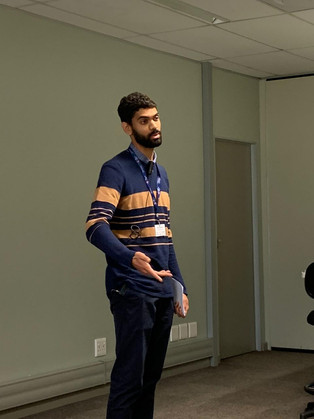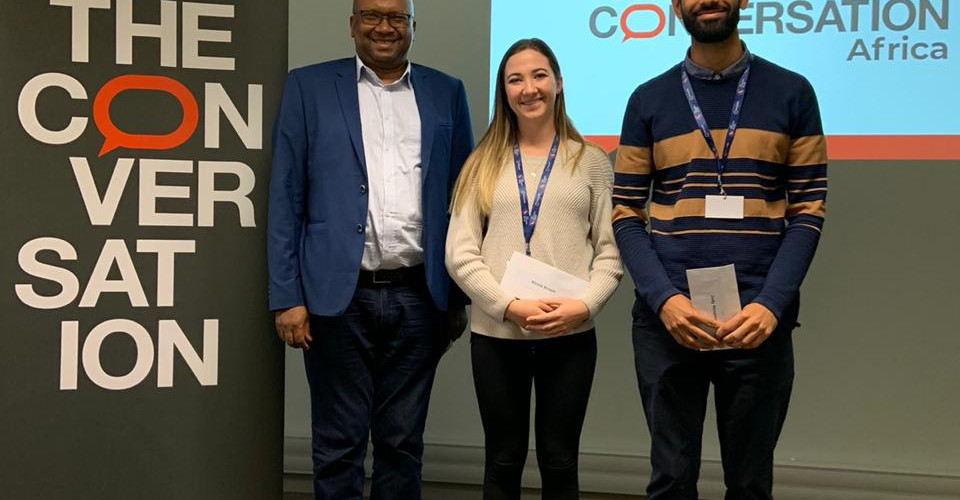CBTBR Science Communication Awards
- MBHG

- Dec 9, 2019
- 4 min read
Science communication forms a vital part of research, wherein scientists share their research findings and the impact thereof with the public. It enables researchers to extend their reach beyond academia, contributing towards democratizing knowledge and empowering society through increased knowledge, understanding and participation in science. There are many ways in which scientists may engage the public, one of which includes popular science writing. Popular science articles provide a great starting point for researchers looking to develop and refine their communication skills, as it affords them the opportunity to practice concept simplification and story-telling without the pressure/stress of physical interaction with their target audience.

The Science Communication Awards were created in 2018, resulting from an innovative collaboration between The Conversation Africa and the DSI-NRF Centre of Excellence (CoE) in Invasion Biology. The competition was so successful in that The Conversation Africa extended the competition to several other CoEs, including the DSI-NRF CoE for Biomedical Tuberculosis Research (CBTBR). The CBTBR launched its official Science Communication Essay Writing Competition, in partnership with The Conversation Africa and the Centre for Research on Evaluation, Science and Technology (CREST), in June 2019. The competition was open to Master’s and Doctoral postgraduate students within in the Centre, boasting an impressive cash prize to the winners of the MSc and PhD category respectively. To enter students had to submit an 800-word essay describing their research, in the format of a popular science article for publication in The Conversation.
Students were given until the 31st October 2019 to submit their piece to The Conversation for consideration in the competition. A total of 14 entries were received, of which 6 were from MSc candidates and the remaining 8 from PhD candidates. The articles were judged by science journalists at The Conversation Africa, according to the following criteria:
· How well the entrant wrote to length
· How well the entrant avoided jargon, technical language, acronyms
· How well the entrant wrote an article that was clear, concise and easy to read
· How well the entrant answered the ‘So what?” question (content relevance)
· Whether the entrant’s contribution was based on research
· Was the content new, unusual and/or different
On the 3rd December 2019, the CBTBR Science Communication Awards Day was held, wherein the winners of the CBTBR Writing Competition were announced. The days activities included presentations by international Guest Speakers and world class Science Communication experts, Dr Jenni Metcalfe and Mr Toss Gascoigne from Econnect, Australia, a series of 3-minute FameLab style talks from the competition entrants followed by a feedback session for our international guests, as well as panel discussion with several Science communication experts including Dr Jenni Metcalfe, Mr Toss Gascoigne, Dr Marina Joubert (Science Communication expert at CREST), Mr Jabulani Sikhakhane (Deputy Editor at The Conversation Africa) and Ms Candice Bailey(Academic Relations Officer with extensive media editing experience at The Conversation).
The event ended on a sweet note with the awards ceremony in which the winners of the 2019 CBTBR Science Communication Essay Competition were announced. The prize for each category winner included a R30 000 travel award to cover costs to attend a local/international conference, sponsored attendance at the 2-day Stellenbosch University Science Communication Workshop presented by Dr Jenni Metcalfe and Mr Toss Gascoigne on the 4-5th December, as well as publication of their essay on The Conversation Africa online platform. The winners of the 2019 CBTBR Science Communication Awards were as follows:
Tied for first place in the MSc category was Ms Ayanda Shabangu and Ms Kristen Winkler with their award-winning essays titled “My journey to discovering Tuberculosis” and “Two is better than one” respectively;
And in second place in the MSc category was Ms Katrin Smith with her essay titled “Tuberculosis Threatens our Beloved Big Five”;
According to the judges, Ayanda had a “brilliant explanation of what TB is and the way it works. And Kristen made a “great effort to make her article readable and her article was very carefully and cleverly broken down and explained.”
In first place in The PhD category was Ms Raeesa Hussan with her award-winning essay titled “Using nature as an alternative source of drugs to combat TB”;
And in second place in the PhD category was Ms Naomi Okugbeni with her essay titled “Scientists recreate Tuberculosis (TB) infection: Coupling cellular infection models with Fluorescence Microscopy”.
According to the judges, Raessa had good background and context and managed to produce an article that was easy to read and free of jargon.
This event is just one example of the many ways in which the CBTBR engages in knowledge brokerage, with the key aim of disseminating research discoveries made within the centre through engagement with the broader scientific community, policymakers and the public. The purpose of this exercise was to underscore the fact that Science Communication forms a vital part of research, wherein scientists are not only obliged but encouraged to share their research and the impact thereof with various stakeholders in the form of science engagement, not only to the benefit of their target audience but toward the improvement of their own understanding. These efforts facilitate the conduct of people-centred research, wherein real-world issues and concerns are addressed, with the overarching goal to improve the health and well-being of all individuals affected by the Centres research.
To highlight the incredible efforts of all the contestants that took part in the competition, and the value of science communication with research, our blog will be posting one essay from participating students each week. We hope that this inspires them to continue their science communication journey to put their research out into the public domain, and engage with society to assist, listen, learn and co-create, throughout their research career.
- Written by Dannielle K Moore
- Photography by Dannielle K Moore







































Comments